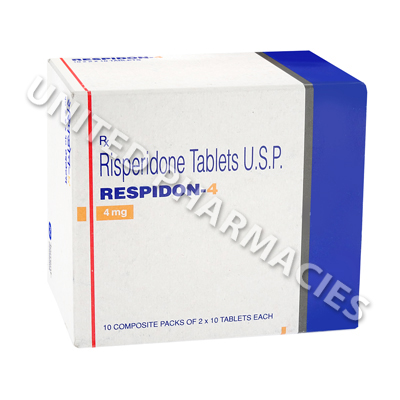Customers also like
Respidon (Risperidone) - 2mg (10 Tablets)
from only £2.56
Risperdal (Risperidone) - 1mg (60 Tablets)
from only £29.07
Apo-Ropinirole (Ropinirole Hydrochloride) - 0.25mg (100 Tablets)
from only £8.96
Apo-Ropinirole (Ropinirole Hydrochloride) - 2mg (100 Tablets)
from only £28.24
Bexol (Trihexyphenidyl) - 2mg (10 Tablets)
from only £1.32
Rasalect (Rasagiline) - 0.5mg (10 Tablets)
from only £6.39
Quetapel (Quetiapine Fumarate) - 25mg (90 Tablets)
from only £9.87
Description
| Main Use | Active Ingredient | Marketed Name |
| Schizophrenia treatment | Risperidone | Respidon |
Uses
Respidon (Risperidone) is a monoaminergic antagonist which is used for treating schizophrenia. Medical experts believe that it works by functioning as an antagonist of the serotonin and dopamine receptors. Psychotic disorders (including schizophrenia) are often associated with an abnormality in the brain's dopamine activity, which is believed to be related to the fact that neurotransmitters play a central role in the regulation of behaviour and mood.
Treatment with this medicine aims to alleviate these symptoms by acting as an antagonist of the D2 dopamine and 5HT2 serotonin receptors, so as to reduce excess dopamine activity and minimize the disturbances to the mental well being of the patient. Control of hallucinations, delusions, social problems and other common schizophrenia symptoms is therefore possible. Some doctors may also treat patients affected by other conditions with it.
Dosage and Administration
Respidon (Risperidone) is provided in tablet form, and each one contains 4mg of the main ingredient. Usually, patients will be told to begin treatment with a low dosage, which may then be increased by the doctor on an incremental basis. Some doctors may direct the patient to begin with 1mg, taken twice per day. Following this, adjustments may be ordered on days 2 and 3 of treatment. Any further adjustments will only be ordered by your doctor at 1 week intervals. Do not exceed the dosage recommended by your doctor.
Side effects
Treatment of psychotic illnesses or any other conditions with Respidon (Risperidone) may lead to side effects in some patients, which could include:
- Salivation
- Appetite increases
- Agitated or restless feeling
- Unexpected production of breastmilk
- Soreness affecting the joints or elsewhere in the body
You will need to inform your doctor if any side effects are noticed. Some of the reactions that this medicine has the potential to trigger are serious, and will necessitate immediate medical help. Examples of this can include seizures, bleeding from the nose, an erection that will not go away, tremors, symptoms of a fever and other possible serious side effects that have not been listed here.
Precautions
This medicine is associated with increasing weight gain in some patients. Your doctor may advise exercise and a special diet. Also, it may increase the likelihood of suffering from heatstroke in hot weather or hypothermia when it is cold. Take extra precautions to avoid this.
Patients who suffer from unusual movements affecting the tongue, jaw or elsewhere in the body may be told to stop treatment by their doctor, as this could be a sign of tardive dyskinesia, a serious side effect.
Seek immediate emergency medical attention if you suffer an allergic reaction. Symptoms to watch for, which may be indicative of a reaction, include skin rashes, hives, swelling of the face or limbs, trouble breathing, and trouble swallowing.
Always use Respidon (Risperidone) as you have been prescribed by your doctor. Never self-medicate or change your dosage without first consulting your doctor. The correct dosage can vary depending on your health, medical history, and the severity of the condition being treated.
This medication may not be safe for all patients. Before you begin using it always disclose the following to your doctor:
- If you are pregnant or breastfeeding.
- If you suffer from any allergies.
- If you suffer from any other health conditions or illnesses.
- If you are using any other medicine (including all non-prescription).
- If you are using any supplements, vitamins, or herbal products of any kind.




-Tab-1mg-UK-1s.jpg)
-Tab-0.25mg-UK-1s.jpg)
-Tab-2mg-UK-1s.jpg)
-Tab-2mg-UK-1s.jpg)
-Tab-0.5mg-UK-1s.jpg)
-Tab-25mg-UK-1s.jpg)




